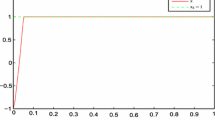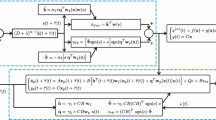Abstract
A new learning algorithm for fuzzy system to approximate unknown nonlinear continuous functions is presented. Fast terminal sliding mode combining the finite time convergent property of terminal attractor and exponential convergent property of linear system is introduced into the conventional back-propagation learning algorithm to improve approximation ability. The Lyapunov stability analysis guarantees that the approximation is stable and converges to the unknown function with improved speed. The proposed fuzzy approximator is then applied in the control of an unstable nonlinear system. Simulation results demonstrate that the proposed method is better than conventional method in approximation and tracing control of nonlinear dynamic system.
Preview
Unable to display preview. Download preview PDF.
Similar content being viewed by others
References
Wang, L.X.: Fuzzy Systems are Universal Approximators. In: Proc. IEEE International Conf. on Fuzzy System, San Diego, pp. 1163–1170 (1992)
Zhang, T.P., Yang, Y.Q., Zhang, H.Y.: Direct Adaptive Sliding Mode Control with Nonlinearly Parameterized Fuzzy Approximators. In: Proceedings of the 4th World Congress on Intelligent Control and Automation, Shanghai, China, pp. 1915–1919 (2002)
Yue, S.H., Zhang, K.C.: An Optimal Fuzzy Approximator. Appl. Math. J. Chinese Univ. Ser. B 17(2), 236–240 (2002)
Wang, L.X., Mendel, J.M.: Back-propagation Fuzzy Systems as Nonlinear Dynamic System Identifiers. In: Proc. IEEE International Conf. on Fuzzy System, San Diego, pp. 1409–1418 (1992)
Qian, N.: On the Momentum Term in Gradient Descent Learning Algorithms. Neural Networks 12(2), 145–151 (1999)
Hill, S.I., Williamson, R.C.: Convergence of Exponentiated Gradient Algorithm. IEEE Trans. Signal Process 49, 1208–1215 (2001)
Yu, X., Man, Z., Wu, Y.: Terminal Sliding Modes with Fast Transient Performance. In: Proceedings of the 36th IEEE CDC, San Diego, pp. 962–963 (1997)
Yu, X., Man, Z.: Fast Terminal Sliding Mode Control Design for Nonlinear Dynamic Systems. IEEE Trans. Circuits Systems Part I 39(2), 261–264 (2002)
Author information
Authors and Affiliations
Editor information
Editors and Affiliations
Rights and permissions
Copyright information
© 2006 Springer-Verlag Berlin Heidelberg
About this paper
Cite this paper
Liu, Y., Cao, F., Peng, Y., Yang, X., Miao, D. (2006). A Novel Fuzzy Approximator with Fast Terminal Sliding Mode and Its Application. In: Wang, L., Jiao, L., Shi, G., Li, X., Liu, J. (eds) Fuzzy Systems and Knowledge Discovery. FSKD 2006. Lecture Notes in Computer Science(), vol 4223. Springer, Berlin, Heidelberg. https://doi.org/10.1007/11881599_20
Download citation
DOI: https://doi.org/10.1007/11881599_20
Publisher Name: Springer, Berlin, Heidelberg
Print ISBN: 978-3-540-45916-3
Online ISBN: 978-3-540-45917-0
eBook Packages: Computer ScienceComputer Science (R0)




